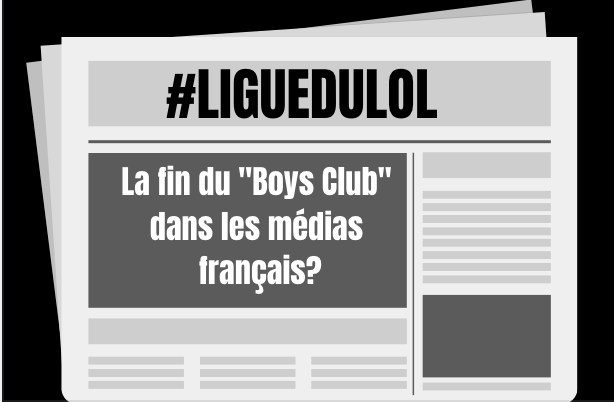4 March 2019
Country: France
by: Sophie Chauvet

 The #LigueduLOL scandal shook the French media to its core. Now that it has been exposed, will the media seize the moment, and tackle its discrimination problem?
The #LigueduLOL scandal shook the French media to its core. Now that it has been exposed, will the media seize the moment, and tackle its discrimination problem?
Last month, the French daily newspaper Libération revealed that a group of prominent French journalists have been organizing sexist, racist and homophobic online harassment campaigns against their female counterparts in a secret Facebook group nicknamed, “La Ligue Du LOL,” or, “The LOL League.”
Over the years, the group of around thirty have spread memes ridiculing their female colleagues, coordinating complex online sexual harassment campaigns and prank called them, posing as an employer offering them a job, only to record and publish the conversation to their humiliation. One journalist, Nassira El Moaddem, who runs Bondy Blog, which gives a platform to journalists from ethnic minorities, recalls two journalists that she attended university with regularly calling her “Saddam” in reference to her Middle Eastern heritage. Another, Lea Davy recently spoke out about how she internalized this constant humiliation since her university days, where she suspects that this sexist culture is cultivated in France’s most elite journalism schools.
While many of the #LigueDuLOL’s prominent members climbed the ladder of the elite French media world, their targets were left to grapple with endless humiliation while trying to pursue an increasingly difficult career. As their harassers were rewarded with senior editorial positions, victims were left struggling, often overlooked for promotions and opportunities and forced to freelance or work in precarious, short-term roles.
Why Now?
If the #LeagueDuLOL has been operating for the better part of a decade, why is it only being exposed now? While there have been many attempts to investigate the French media’s “Boy’s Club,” it is only after Liberation’s revelation that victims’ testimonies began to flourish online. Many reported the members of the league creating pornographic photomontages of them, impersonating them, and other degrading acts that could have been devastating to their careers.
How did it rise to prominence? French journalist Iris Gaudin explains that many of the most prominent harassers also cultivated a “cult of personality” around them on social media, particularly in 2009, where Twitter was “the cool place to be” among French journalists.
“If one of them retweeted a joke or a link that we posted, we would feel validated,” she says, recalling the bizarre power dynamic. However, after she was harassed by one of them following an intimate relationship, she realized that their goal was to humiliate, and strip their female colleagues of dignity by any means possible.
As it turns out, LigueDuLOL is just one of several “misogyny forums”—Huffington Post France had its own sexist Slack channel, and VICE has frequently been criticized for rampant misogny in its Parisian offices. Liberation, Slate, and Les Inrocks all had members of the league in their newsrooms.
What Next?
While #MeToo did not have the same impact in France as it did in the English-speaking world—and even faced backlash, such as harassers suing victims for defamation and celebrities like Catherine Deneuve signing a manifesto against it, it seems that French female journalists may finally be having their moment of justice. Since the accusations were published, several editors and journalists have been suspended, and many newsrooms have had a long overdue moment of introspection.
Many French journalists celebrated; in an interview with Telérama, Aude Lorriaux, founder of Prenons La Une (Seize the Front page), an organization advocating for better representations of women in the media, expressed her optimism, “Actions were taken very quickly after the revelations,” she said. “This is meaningful progress that we can celebrate.”
However, there is still a long way to go. Legally, it is difficult—many of the most incriminating social media posts have been deleted, making it difficult to prove certain accusations. What is more, the real reason that #LigueDuLOL existed in the first place is the overwhelmingly white, male, middle class composition of French newsrooms. While it is illegal to report statistics on ethnicity—making it difficult to gauge racial diversity—in 2017, only 26 percent of senior management roles in France were filled by women.
To date, Libération is the only newsroom to question its diversity, only after a picture of the team was posted online and criticised for being too white. As with anywhere, this lack of diversity impacts representation and reduces trust in the media—in France, it created a pervasive culture of sexist, racist and homophobic harassment that targeted anyone who didn’t fit into the mould of what a journalist was supposed to look like.
Still, hopes are high for the renewal of French journalism. Many victims of sexual harassment feel less isolated, and support networks have been strengthened. Now, Twitter, which once amplified the “Boys Club” approval is calling for French newsrooms to replace the harassers that have been suspended with the talented survivors of their abuse. One scandal at a time, the French media is finally taking on it’s “Boy’s Club” mentality, and the newsroom will be a better, more inclusive and diverse place because of it.